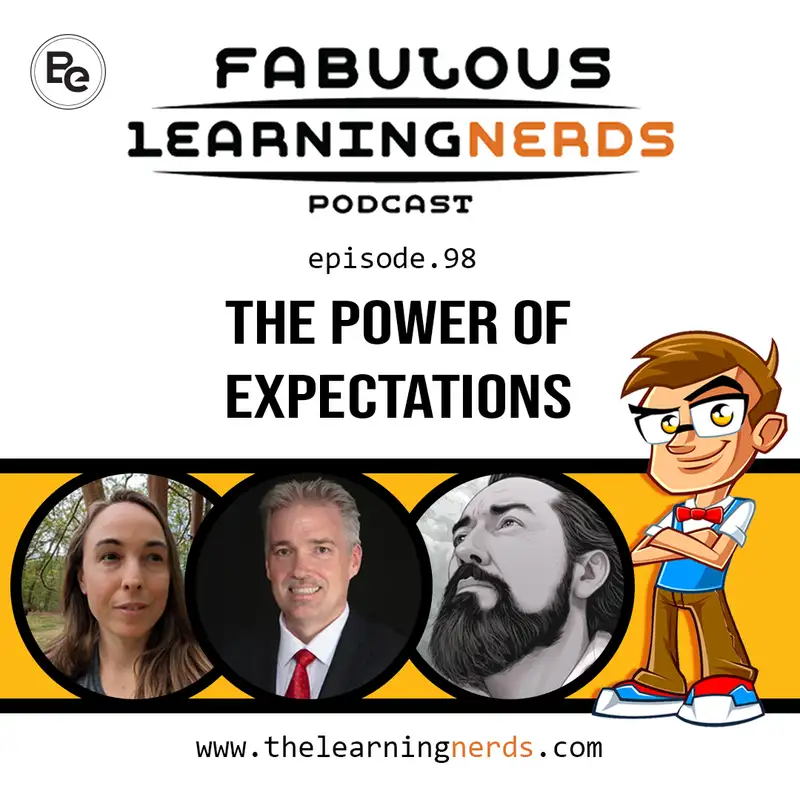Episode 98 - The Power of Expectations
Visit us at https://www.thelearningnerds.com
Get ready for another enlightening and entertaining episode of the Fabulous Learning Nerds! Join us as we dive into the transformative power of expectations in the learning process. Whether you're a seasoned educator, a curious learner, or someone just looking to better understand the dynamics of growth, this episode is packed with insights, laughs, and valuable takeaways. So listen in as we take a fun and informative journey breaking down the science and strategies behind effective learning and expectations.
In this Episode:
- The Pygmalion Effect: Discover the intriguing story behind the Pygmalion Effect and how higher expectations can actually elevate performance. Learn how teachers' and trainers' beliefs in their students can make a significant impact.
- Setting Clear and Challenging Goals: Explore the art of setting SMART (Specific, Measurable, Achievable, Relevant, Time-bound) goals. Understand why merely setting goals isn't enough; they need to be challenging and well-communicated to inspire true growth.
- Creating a Supportive Learning Environment: Find out why a safe and supportive environment is crucial for effective learning. Learn how regular feedback and opportunities for practice and reflection can lead to substantial improvements.
Key Takeaways:
- Expectations Matter: Higher expectations from teachers and trainers can significantly boost learner performance.
- Goal Setting: Clear, challenging, and achievable goals are essential for driving growth and development.
- Supportive Environment: A supportive and safe learning environment fosters better practice, feedback, and reflection, leading to greater success.
Connect with the NERDS:
- Email: nerds@thelearningnerds.com
- Facebook: Learning Nerds
- Instagram: @FabLearningNerds
- Website: www.thelearningnerds.com
Don't Miss Out!
Hashtags: #LearningNerds #PowerOfExpectations #PygmalionEffect #SMARTGoals #GrowthMindset #EducationalPodcast #AdultLearning #TeacherTips #EffectiveLearning #SupportiveEnvironment
References:
- Black, P., & Wiliam, D. (1998). Inside the black box: Raising standards through classroom assessment. Phi Delta Kappan, 80(2), 139-148.
- Dweck, C. S. (2006). Mindset: The new psychology of success. Random House.
- Hattie, J. (2008). Visible learning: A synthesis of over 800 meta-analyses relating to achievement. Routledge.
- Lemov, D. (2015). Teach like a champion 2.0: 62 techniques that put students on the path to college. Jossey-Bass.
- Rosenthal, R., & Jacobson, L. (1968). Pygmalion in the classroom. The Urban Review, 3(1), 16-20.
- Rubie-Davies, C., Peterson, E., Sibley, C., & Rosenthal, R. (2015). A teacher expectation intervention: Modelling the practices of high expectation teachers. Contemporary Educational Psychology, 40, 72-85.
- Black & Wiliam (1998) - This article discusses the importance of formative assessment in raising student achievement. The authors argue that classroom assessment practices have a significant impact on student learning and that improving these practices can lead to better outcomes.
- Dweck (2006) - In this book, psychologist Carol Dweck introduces the concept of mindset and how it affects learning and success. She distinguishes between a fixed mindset and a growth mindset, emphasizing the importance of the latter in promoting resilience, motivation, and achievement.
- Hattie (2008) - This book synthesizes over 800 meta-analyses related to student achievement. John Hattie identifies and ranks various influences on student learning, including teacher expectations, which he finds to have a significant effect size.
- Lemov (2015) - This book offers 62 practical techniques for educators to improve their teaching and put students on the path to success. Lemov emphasizes the importance of setting high expectations, creating a positive classroom culture, and providing support for students to meet those expectations.
- Rosenthal & Jacobson (1968) - This seminal study demonstrates the Pygmalion Effect, showing how teacher expectations can influence student performance. The researchers found that when teachers were led to expect enhanced performance from some students, those students showed significantly greater gains in achievement compared to others.
- Rubie-Davies et al. (2015) - This article describes an intervention that aimed to model the practices of high-expectation teachers. The study found that teachers who received the intervention training showed changes in their expectations and instructional practices, leading to improved student outcomes.
- Black & Wiliam (1998) - Inside the Black Box: Raising Standards Through Classroom Assessment Link: https://pdfs.semanticscholar.org/15bc/cadd19dbeb64ee5f0edac90e5857e6d5ad66.pdf
- Dweck (2006) - Mindset: The New Psychology of Success Book link (Amazon): https://www.amazon.com/Mindset-Psychology-Carol-S-Dweck/dp/0345472322
- Hattie (2008) - Visible Learning: A Synthesis of Over 800 Meta-Analyses Relating to Achievement Book link (Amazon): https://www.amazon.com/Visible-Learning-Synthesis-Meta-Analyses-Achievement/dp/0415476186
- Lemov (2015) - Teach Like a Champion 2.0: 62 Techniques that Put Students on the Path to College Book link (Amazon): https://www.amazon.com/Teach-Like-Champion-2-0-Techniques/dp/1118901851
- Rosenthal & Jacobson (1968) - Pygmalion in the Classroom Journal article link (Springer): https://link.springer.com/article/10.1007/BF02322211
- Rubie-Davies et al. (2015) - A teacher expectation intervention: Modelling the practices of high expectation teachers Journal article link (ScienceDirect): https://www.sciencedirect.com/science/article/pii/S0361476X14000253

